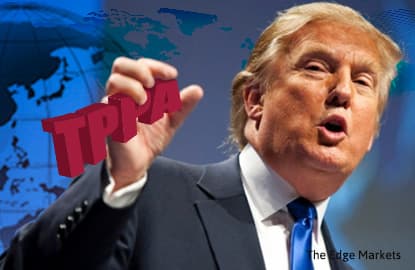
(Nov 30): The Trans-Pacific Partnership, which would have created trade links between the US, Japan and a number of other Asian countries, is dead. Donald Trump has vowed to kill the pact on his first day in office. That won’t be a hard promise to keep, as the trade deal was already effectively dead — Trump’s move is just a flourish.
The TPP had garnered opposition from both sides of the political spectrum — Bernie Sanders supporters were dead set against it as well. Progressive activists walking past my house had “Stop TPP” buttons on their backpacks. If there was any policy that was doomed this election cycle, it had to be this one. I don’t really know, but I suspect that the TPP mostly acted as a scapegoat for more general fears about globalisation — a symbolic show of strength by skeptics of trade deals.
Free Trade and Its Foes
Killing the TPP will have only a small impact on the nation’s economy, just as passing it would have generated only small benefits. The real risks are to the US’s international prestige, and to the economic health of key American allies.
The void that the TPP leaves will be filled by China and Russia. Already, these countries are pushing their own Asia-Pacific free-trade area. Trade deals have a major political component — they cement alliances and give large countries more influence. By leaving Asian economic integration to China and Russia, the US weakens its bond with key regional ally Japan, and passes up an opportunity to deepen an alliance with Vietnam. These and other Asian countries will now have every incentive to move closer to the US’s big rivals.
The TPP would also have given an economic boost to US allies. With a reliable market for its goods, Vietnam would have been better able to take advantage of export-led growth, sending it down the same path that worked for South Korea, Taiwan and others.
Japan, meanwhile, could have used the TPP to help its efforts to jump-start its large, ailing economy. The administration of Prime Minister Shinzo Abe has been trying to improve productivity by opening more of the country’s protected industries to international competition. TPP would have helped with that. The stronger Japan’s economy, the more the US can rely on the country in case of a confrontation with China or North Korea.
But, oh well. What’s done is done. The question now is: How can the US limit the risks from the TPP’s demise?
The biggest step would be to conclude a bilateral trade agreement with Japan. This would reassure the US’s top Asian ally that America is still committed to its security and its economic advancement.
Japan is a developed economy, so a US-Japan free-trade agreement wouldn’t put many American workers in danger. Instead, it would be a big opportunity for US companies. Many of Japan’s industries are protected against foreign competition, mostly by non-tariff barriers and regulations. The most famous example is the auto industry, but service industries such as finance, telecommunications and retail are probably also very protected. It’s no coincidence that these industries are less productive in Japan than in the US, since they haven’t had to raise their game to fend off foreign competition.
Opening up Japan’s service sector through a US-Japan free-trade agreement would stimulate Japanese companies to increase productivity by adopting modern business practices. But it would also potentially be a huge boon to US exporters. Services, as opposed to goods, are an increasingly important part of what US companies sell overseas.
But services aren’t the only area where the US could sell more to Japan. Technology is another. The country that once gave the US the Walkman and the VCR is now crazy for iPhones. US tech products have real appeal in Japan, and a trade agreement could accelerate that trend.
A US-Japan trade deal could be politically appealing to leaders in both countries. President Trump could sell an export-boosting measure as an example of “winning” at international trade. Abe could sell a US-Japan accord as a bulwark of Japan’s security, as well as a structural reform to raise productivity. Both men could walk away claiming victory — and both would be correct.
So while the TPP is dead, a US-Japan trade deal should be the first thing to take its place. Japan is a large, wealthy ally that's too important for the US to write off. By integrating the US and Japan’s economies more closely, both countries can reap economic and strategic benefits. – by Noah Smith, Bloomberg View
This column does not necessarily reflect the opinion of the editorial board or Bloomberg LP and its owners.